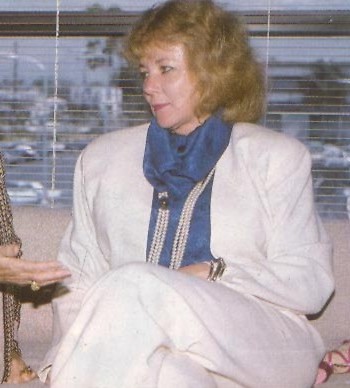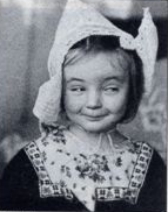By Roberta Caploe, Soap Opera Digest, 1991
|
|
Home | Cette page en Franšais |
| Can Santa Barbara be saved ? | |||||
|
By Roberta Caploe, Soap Opera Digest, 1991 |
|
||||
 Bridget
Dobson has returned to the scene of the crime. She and husband Jerry Dobson
recently settled a lawsuit with New World Television and NBC that erupted three
and a half years ago, centering on creative control of Santa Barbara.
Now, she and Jerry are faced with the task of putting Santa Barbara
back together again, before the network ax falls.
Dobson
is crisp and forthright as she explains where she feels Santa Barbara
went wrong : "As I look at the past of Santa Barbara, though
I didn't watch it, there are so many stories that started and stopped. Where did
they go ? How did this happen ? Santa Barbara is a unique show,
but it wasn't meant to be popping stories back and forth. There were so many
cast changes via plot changes that the audience was lost in the shuffle. That is
why we are continuing with the Eden split-personality story. That was not ours.
It was not one I would have chosen for Eden, because she is such a squared away,
strong women. But we didn't want to abort it as so many other stories have
been."
Bridget
Dobson has returned to the scene of the crime. She and husband Jerry Dobson
recently settled a lawsuit with New World Television and NBC that erupted three
and a half years ago, centering on creative control of Santa Barbara.
Now, she and Jerry are faced with the task of putting Santa Barbara
back together again, before the network ax falls.
Dobson
is crisp and forthright as she explains where she feels Santa Barbara
went wrong : "As I look at the past of Santa Barbara, though
I didn't watch it, there are so many stories that started and stopped. Where did
they go ? How did this happen ? Santa Barbara is a unique show,
but it wasn't meant to be popping stories back and forth. There were so many
cast changes via plot changes that the audience was lost in the shuffle. That is
why we are continuing with the Eden split-personality story. That was not ours.
It was not one I would have chosen for Eden, because she is such a squared away,
strong women. But we didn't want to abort it as so many other stories have
been."
Dobson
acknowledges that Santa Barbara had acquired a reputation for
being The Eden and Cruz show and this is something else she feels needs
correcting. "I want Eden and Cruz in the forefront, but I want other
couples as well. We are going to have a balance. In a few months, there will be
a Kelly story, a Julia story, an Eden story and a Mason story, but all will have
equal prominence," she promises. Bridget has said to various members of the
press that the critical character needing to be realigned was Mason, the cynical
narrator of the family's activities, forever locked in a tempestuous
relationship with his father. She remarks that Gordon Thomson, who plays Mason, "is
coming along fine. We talked to him at great length (about who) the old Mason
was. We explained and he got into it." Seeing Mason nastily, eloquently
face off against C.C. is a telltale sign of the Dobsons' reappearance.
What Bridget didn't reveal is that Mason's relationship with his parents mirrors her own relationship with her parents, Frank and Doris Hursley. From inauspicious beginnings as the winners of a script-writing contest sponsored by Wrigley's Chewing Gum, the Hursleys went on to write for Search for Tomorrow, and then created General Hospital. But Bridget says that her parents tried to discourage her, at any cost, from becoming a soap opera writer. "I really wanted to write. My parents would not give me a job - they said I was a party girl who would never meet a deadline. (Bridget counters : "I was a timid little mouse. I'm much wilder now".) There was a major, major scene that went on until four in the morning, where I said, "I want to be given a chance to write. I have all the credentials." (Bridget was an undergraduate at Stanford University, earned a business degree from Harvard University, and then returned to Stanford for a mass communications degree with an emphasis in television.) Their position was, "No. You are a party girl. What if we have to fire you ?" I finally said, "Debbie (Bridget's sister) had a chance to write and she didn't even want to." I insisted, saying, "Either I get to write, or I leave the family." The day I came home from the hospital with Andy, my son, was the first day I started writing."
 Dobson
eventually wrote five scripts a week for General Hospital, which
she describes as a "grand learning process. I learned from my mistakes. I
got criticized plenty, and then I started to feel that no one would ever pay me
for my writing, except my parents." Bridget gave her mother and father two
years' notice - news that was not taken well. "As (the deadline) got
closer," recalls Bridget, "I said to my father, "I have to leave.
Somebody else has to pay me for my writing." He said, "Nobody will pay you for
your writing.""
But
people did, including Guiding Light and As the World Turns,
which Bridget head wrote with husband Jerry. "My parents never watched any
other show I wrote," Bridget notes. "My mother used to say she didn't
watch what I wrote on other shows because she wanted to be proud of me. She
wasn't sure she could be if she watched." Dobson's anger is clear, but she
offers an explanation, saying, "They were very bright. They loved me a lot.
Perhaps my leaving felt like I was betraying that love. I think they wanted to
hold me tight even though they didn't me in." Santa Barbara and
Mason, of course, are Dobson's method of catharsis. "'I use Santa
Barbara and vent it all," she points out.
Dobson
eventually wrote five scripts a week for General Hospital, which
she describes as a "grand learning process. I learned from my mistakes. I
got criticized plenty, and then I started to feel that no one would ever pay me
for my writing, except my parents." Bridget gave her mother and father two
years' notice - news that was not taken well. "As (the deadline) got
closer," recalls Bridget, "I said to my father, "I have to leave.
Somebody else has to pay me for my writing." He said, "Nobody will pay you for
your writing.""
But
people did, including Guiding Light and As the World Turns,
which Bridget head wrote with husband Jerry. "My parents never watched any
other show I wrote," Bridget notes. "My mother used to say she didn't
watch what I wrote on other shows because she wanted to be proud of me. She
wasn't sure she could be if she watched." Dobson's anger is clear, but she
offers an explanation, saying, "They were very bright. They loved me a lot.
Perhaps my leaving felt like I was betraying that love. I think they wanted to
hold me tight even though they didn't me in." Santa Barbara and
Mason, of course, are Dobson's method of catharsis. "'I use Santa
Barbara and vent it all," she points out.
At her side is Jerry, whom Dobson refers to as her "divine, pig-headed husband." She offers : "I love working with him. Sometimes I wish we weren't (working together), but mostly it enhances the marriage. I've been bored maybe three days in the last thirty years. Jerry just has a way of looking at the world, life, love and circumstances that nobody else does. You know what Jerry's mind is like when you know Santa Barbara."
Bridget feels they need two years to raise the show's ratings. "If the numbers don't go up," she admits, "I have to say that Santa Barbara will be canceled. I am not sure how long it takes to turn around a show that has been as decimated as this one has. The network has been a little surprised by our choices, but supportive of them." But having survived what she has and emerging on the other side, Bridget pragmatically comments, "I will be sorry to see Santa Barbara go if it is canceled. It would be sad but my life would go on. I would find happiness elsewhere."